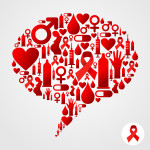 Human immunodeficiency virus (HIV) is a virus that attacks the body’s immune system. If HIV isn’t treated it can progress into acquired immunodeficiency syndrome (AIDS). However, with early testing and proper medical care it’s unlikely that HIV will progress into AIDS. Anyone who has unprotected sex (without a condom) and or shares needles or injection drug equipment is at an increased risk for developing HIV/AIDS. The virus is spread through contact with infected blood, semen, vaginal fluid, and or breast milk. The best way to prevent transmission of HIV always use a condom, this will also help prevent pregnancy and sexually transmitted infections (STIs).
Human immunodeficiency virus (HIV) is a virus that attacks the body’s immune system. If HIV isn’t treated it can progress into acquired immunodeficiency syndrome (AIDS). However, with early testing and proper medical care it’s unlikely that HIV will progress into AIDS. Anyone who has unprotected sex (without a condom) and or shares needles or injection drug equipment is at an increased risk for developing HIV/AIDS. The virus is spread through contact with infected blood, semen, vaginal fluid, and or breast milk. The best way to prevent transmission of HIV always use a condom, this will also help prevent pregnancy and sexually transmitted infections (STIs).
There are three different ways you can be tested for HIV; fourth generation blood test, rapid test (finger stick and oral tests), and confirmatory test nucleic acid testing (NAT). The test you are asking about is the rapid test, which takes about 20 minutes to get results, but it will only show accurate results 6 to 8 weeks after exposure. The rapid test can give three different results: invalid, non-reactive, and reactive. A reactive result means exactly what you said it “is considered a preliminary positive and means that HIV antibodies were found.” If this occurs, a second confirmatory test (NAT) needs to be performed. If the NAT test results as negative, it is likely that you will need another test to confirm your results. If you are concerned that you have contracted HIV or AIDS, schedule an appointment with your health care provider (HCP) to receive HIV testing, immediately.
 Young Men's Health
Young Men's Health